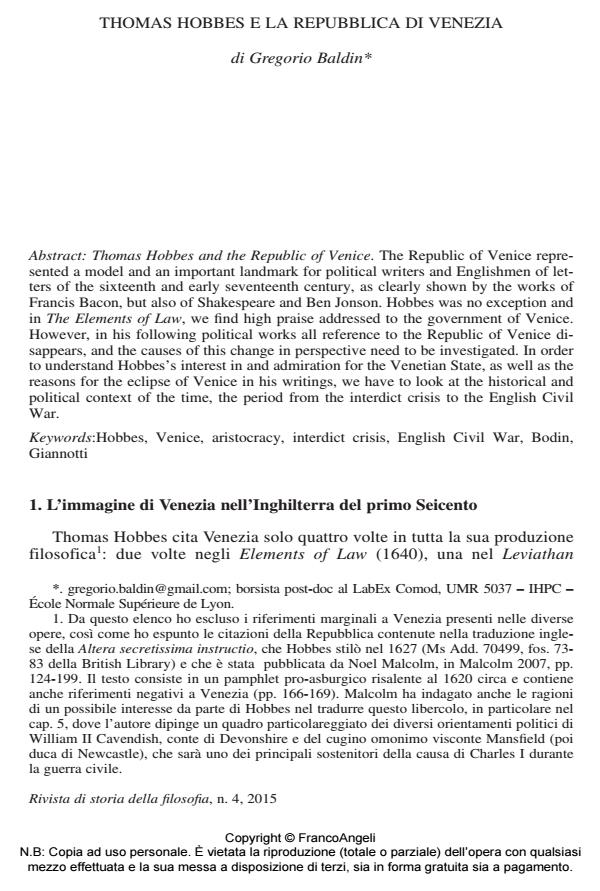Thomas Hobbes e la Repubblica di Venezia
Titolo Rivista RIVISTA DI STORIA DELLA FILOSOFIA
Autori/Curatori Gregorio Baldin
Anno di pubblicazione 2015 Fascicolo 2015/4
Lingua Italiano Numero pagine 25 P. 717-741 Dimensione file 599 KB
DOI 10.3280/SF2015-004002
Il DOI è il codice a barre della proprietà intellettuale: per saperne di più
clicca qui
Qui sotto puoi vedere in anteprima la prima pagina di questo articolo.
Se questo articolo ti interessa, lo puoi acquistare (e scaricare in formato pdf) seguendo le facili indicazioni per acquistare il download credit. Acquista Download Credits per scaricare questo Articolo in formato PDF

FrancoAngeli è membro della Publishers International Linking Association, Inc (PILA), associazione indipendente e non profit per facilitare (attraverso i servizi tecnologici implementati da CrossRef.org) l’accesso degli studiosi ai contenuti digitali nelle pubblicazioni professionali e scientifiche.
The Republic of Venice represented a model and an important landmark for political writers and Englishmen of letters of the sixteenth and early seventeenth century, as clearly shown by the works of Francis Bacon, but also of Shakespeare and Ben Jonson. Hobbes was no exception and in The Elements of Law, we find high praise addressed to the government of Venice. However, in his following political works all reference to the Republic of Venice disappears, and the causes of this change in perspective need to be investigated. In order to understand Hobbes’s interest in and admiration for the Venetian State, as well as the reasons for the eclipse of Venice in his writings, we have to look at the historical and political context of the time, the period from the interdict crisis to the English Civil War.
Parole chiave:Hobbes, Venice, aristocracy, interdict crisis, English Civil War, Bodin, Giannotti
- Hobbes and Galileo: Method, Matter and the Science of Motion Gregorio Baldin, pp.153 (ISBN:978-3-030-41413-9)
- Francis Bacon's Concept of spiritus and Thomas Hobbes Gregorio Baldin, in RIVISTA DI STORIA DELLA FILOSOFIA 3/2019 pp.401
DOI: 10.3280/SF2019-003001 - British Modern International Thought in the Making Mikko Jakonen, pp.45 (ISBN:978-3-031-45712-8)
Gregorio Baldin, Thomas Hobbes e la Repubblica di Venezia in "RIVISTA DI STORIA DELLA FILOSOFIA" 4/2015, pp 717-741, DOI: 10.3280/SF2015-004002